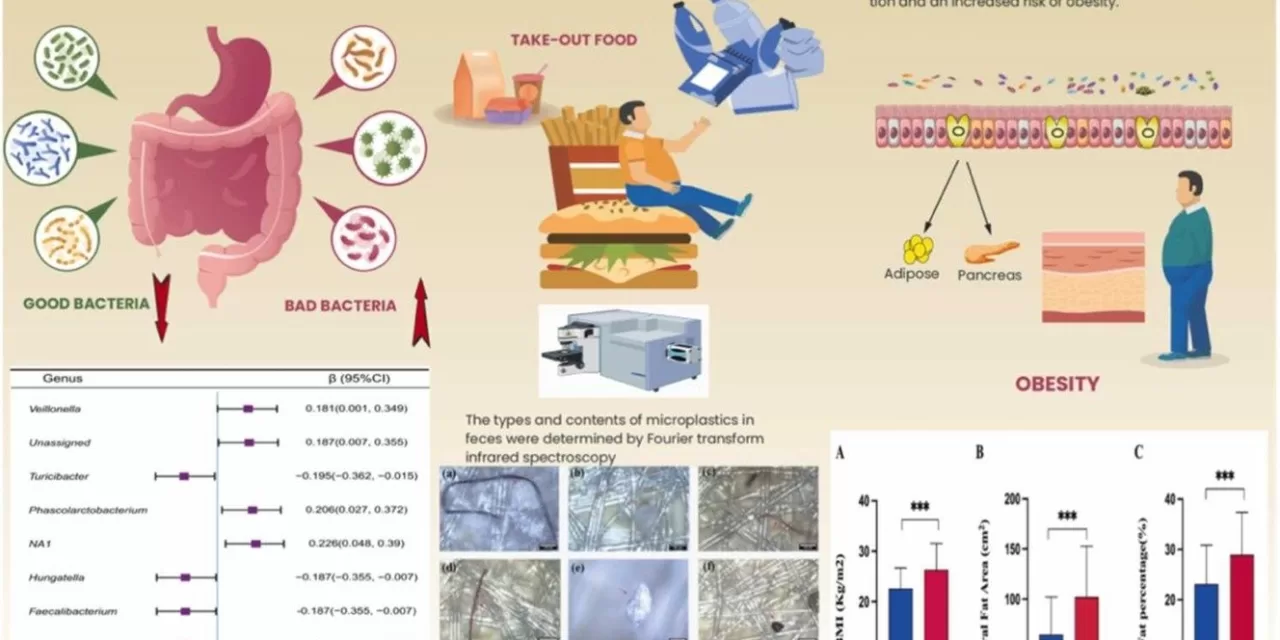Microplastics, tiny particles that have become pervasive in our food, beauty products, and even the air we breathe, pose a range of health risks. Research has linked them to conditions such as heart disease, stroke, digestive problems, and even cancer. However, there’s growing evidence that these microscopic particles can also contribute to weight gain.
Hormone Disruption and Weight Gain
According to Christopher Thompson, MD, a Harvard Medical School researcher specializing in weight loss, microplastics act as endocrine disruptors. “Microplastics can mimic cortisol, estrogen, and other hormones,” Thompson said, explaining how these particles interfere with our body’s natural hormone balance.
Cortisol, known as a stress hormone, regulates important bodily functions such as blood sugar levels, inflammation, and blood pressure. Elevated cortisol levels can lead to weight gain, particularly in the midsection, neck, and face, a condition known as Cushing’s syndrome. Thompson noted that “cortisol is linked to obesity in many ways,” and when microplastics mimic cortisol’s effects, they may exacerbate weight gain.
The Microplastic-Ultra Processed Food Connection
Microplastics are most commonly found in ultra-processed foods, such as hot dogs, chips, and cookies, which make up a large portion of the typical diet in the U.S. “We know that ultra-processed food can be quite detrimental to metabolism,” said Angel Nadal, PhD, a physiology professor at Miguel Hernandez University of Elche in Spain. Nadal emphasized that the endocrine-disrupting effects of microplastics should not be overlooked as a factor in weight gain.
Microplastics in the Environment
Tracking and studying microplastics has proven more challenging than other environmental pollutants, like heavy metals, said Andrew West, PhD, a neurology professor at Duke University School of Medicine. “Concentrations continue to rise as we put more and more into the environment,” West explained. He warned that as microplastics become more prevalent and break down into even smaller particles, their effects on health could worsen.
Reducing Your Exposure to Microplastics
While it may be impossible to avoid microplastics entirely, there are steps you can take to reduce your exposure. One crucial tip is to avoid microwaving food in plastic containers, as the heat increases the rate at which plastics transfer into your food. “That’s exactly what they’re doing when they’re processing food: heating it up in plastic,” said Thompson.
Instead, focus on eating whole foods that aren’t packaged in plastic, such as fresh meats, fruits, and vegetables. Avoid using plastic water bottles, utensils, and even cutting boards. While there’s no proven way to remove microplastics from the body yet, early research suggests that certain probiotics might help trap them in feces, potentially reducing their impact.
BPA and Its Chemical Cousins
One specific chemical of concern is bisphenol A (BPA), which is often used in plastic products such as water bottles and food containers. While the FDA considers BPA safe in small doses, research has shown that chemicals like BPA can lead to metabolic disruptions, insulin resistance, and weight gain. Nadal pointed out that epidemiological studies have linked BPA exposure to diabetes and obesity in humans.
Even products labeled “BPA free” may not be completely safe, warned Thompson. Manufacturers often substitute BPA with bisphenol F (BPF) or bisphenol S (BPS), which are also hormone disruptors. “We’re allowed these chemical substitutions, and it gives us a false sense of security,” Thompson said.
Conclusion
Microplastics present a growing health threat, not only in terms of serious conditions like cancer and heart disease but also through their potential role in weight gain. While avoiding microplastics completely is nearly impossible, reducing exposure through mindful choices in food and product consumption can mitigate their effects. As research into the long-term impacts of microplastics continues, it’s becoming clear that these tiny particles have a much larger impact on our health than previously thought.












